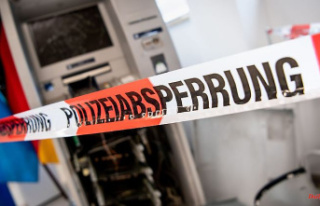Too few staff, poorer pay than in some other federal states and repeated attacks on emergency services: the police union is hoping for improvements in the coming year.
Frankfurt/Wiesbaden (dpa/lhe) - Staff shortages and poorer pay than in other federal states pose challenges for the police in Hesse, according to the state chairman of the police union (GdP). "We are well advised to understand internal security as such and to add a bit more staff," said GdP state chairman Jens Mohrherr.
The stress is not only noticeable in normal everyday life or in the numerous demonstration operations in connection with the Corona policy in spring, but also where police officers have a particularly challenging mission. "We have 330 colleagues fighting child pornography. We need double the staff," said Mohrherr. "We can't offer our colleagues any retreats or preventative treatment because we don't have the staff. Something urgently needs to happen."
The union is also striving to achieve a level of pay similar to that in North Rhine-Westphalia, for example. "The struggle for the best minds does not necessarily mean that Hesse gets the best candidates, who then end up in Bavaria, Rhineland-Palatinate, Thuringia or North Rhine-Westphalia because of the salary," said Mohrherr. But even employees in the police service who are not civil servants are often underpaid for their work. "You don't provide the money so that they are grouped higher and their employment contracts are practically adjusted to reality - and that is a huge mess."
The past two Corona years have been a "huge challenge" for the police - be it in enforcing the Corona measures, be it in use at demonstrations. The police officers were "always caught between the millstones with the Corona deniers and those who mingled with them who reject the state and its democracy," said Mohrherr.
In addition, the police murder in Kusel in Rhineland-Palatinate also caused horror among the police in Hesse at the end of January. At that time it became clear "from what trivialities and base motives two people were torn from life," said Mohrherr. He fears: "Society is slowly eroding, it may have something to do with Corona or existential fears."
In view of the recurring attacks on emergency services, Mohrherr wished that the judiciary would exhaust the sentence more. "This would send signals to possibly nip imitations in the bud. Not every judge makes a judgment, as can also be made on the basis of the criminal law," said Mohrherr. He fears that when the next crime statistics are released, a further increase in the number of attacks on emergency services will be shown. "That worries us a lot."












